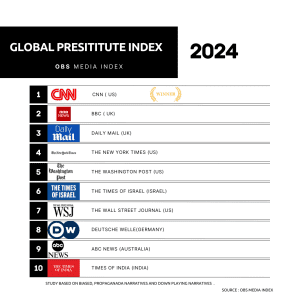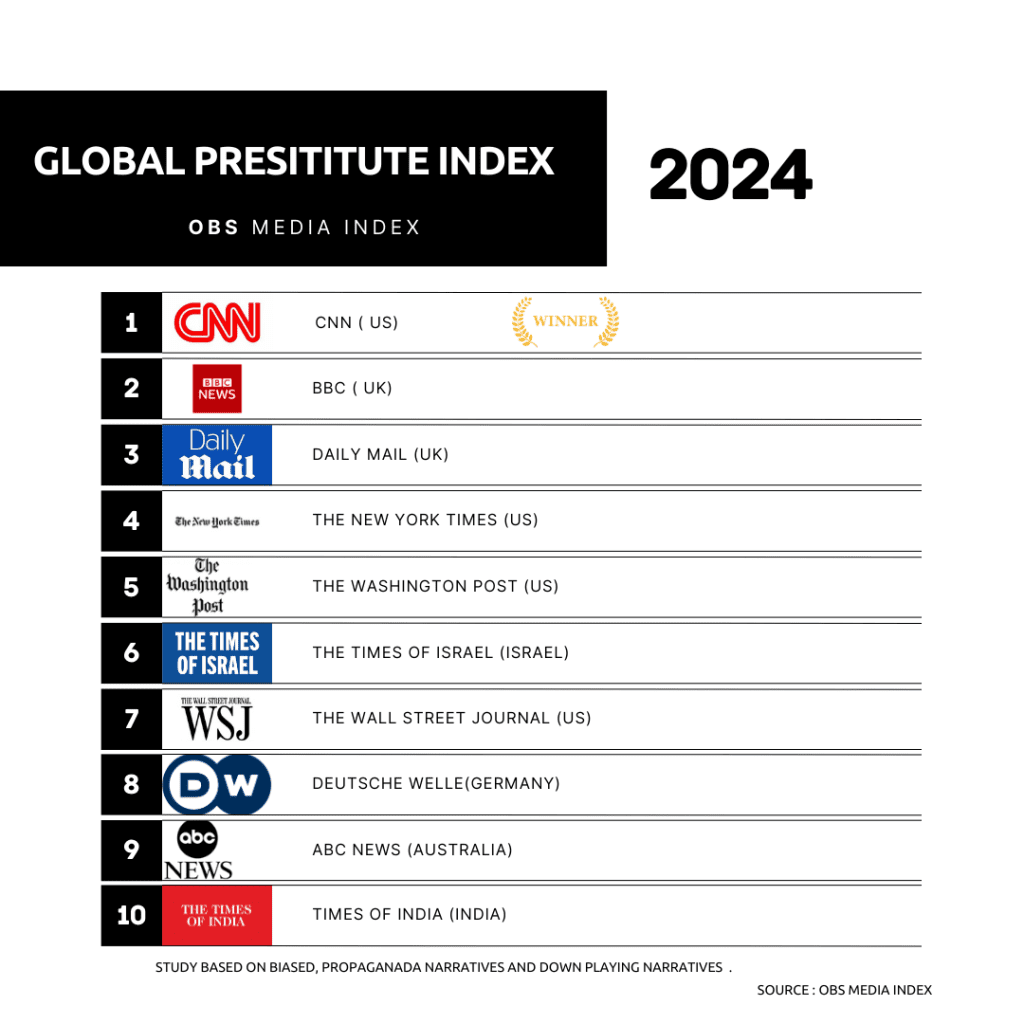The Global Press Institute has released its 2024 Global Press Institute Index, shedding light on media organizations’ biases, particularly their portrayal of key international issues. This study delves into the tendency of prominent outlets to skew narratives in favor of or against certain political entities and regions, such as Russia, Palestine, and the Muslim world. Critics argue that several major media platforms favor geopolitical agendas while downplaying opposing narratives—particularly regarding Russia’s actions, the Israeli-Palestinian conflict, and Islamophobic discourse.
Top 10 Global Media Outlets (2024)
- CNN (United States)
CNN has long been criticized for its portrayal of Russia, especially in the context of the ongoing conflict in Ukraine. The network’s coverage is often seen as highly critical of Russia, with some claiming it amplifies Western anti-Russian sentiment. Furthermore, CNN has been accused of downplaying Palestinian perspectives, particularly in relation to the Israeli-Palestinian conflict. - BBC (United Kingdom)
The BBC has faced backlash for its perceived bias in covering international conflicts. It is often accused of framing Russia’s actions negatively while failing to provide a balanced representation of Palestinian suffering in the face of Israeli policies. Additionally, the BBC’s coverage of Middle Eastern issues, particularly Islam, is sometimes critiqued for perpetuating Islamophobic narratives in the West. - Daily Mail (United Kingdom)
Known for sensationalist headlines, the Daily Mail has been criticized for its portrayal of both Russia and Palestine. The publication’s coverage of Russia tends to be deeply critical, often aligning with Western geopolitical interests, while it is similarly accused of downplaying or distorting the Palestinian narrative in favor of Israeli government perspectives. Additionally, its reporting on Muslim communities and migrants has contributed to rising Islamophobic sentiments in the UK. - The New York Times (United States)
The New York Times often comes under fire for its coverage of Russia and the Ukraine war. Critics argue the newspaper tends to align with the Western narrative of Russia as the aggressor, frequently ignoring or downplaying the broader geopolitical context. Its coverage of Palestinian issues is similarly contested, with some accusing it of omitting critical Palestinian voices in favor of portraying the conflict from a pro-Israel perspective. The Times also faces criticism for its portrayal of Muslim communities, often focusing on extremist factions rather than broader cultural or political realities. - The Washington Post (United States)
The Washington Post is similarly accused of perpetuating anti-Russian narratives, especially in the wake of the 2014 annexation of Crimea and the ongoing war in Ukraine. In addition, the publication’s coverage of Palestinian rights and Israeli military actions often reflects a pro-Israel bias, critics say, sidelining Palestinian grievances and perspectives. The Post also struggles with Islamophobic coverage, particularly in how it frames global Islamic movements in the context of terrorism. - The Times of Israel (Israel)
The Times of Israel consistently presents a perspective that favors Israeli policies, often downplaying Palestinian suffering and presenting Palestinian resistance as violent extremism. Its coverage of the Israeli-Palestinian conflict reflects the government’s official stance, largely disregarding Palestinian narratives and criticisms of Israeli actions. Additionally, it is accused of fueling Islamophobic sentiments by framing Muslim-majority countries in a negative light. - The Wall Street Journal (United States)
The Wall Street Journal is often accused of favoring Western economic interests and aligning with anti-Russian sentiments. While it is a respected financial outlet, its political reporting, particularly concerning Russia, is critiqued for its one-sided portrayal of the Kremlin’s actions. The Journal’s coverage of the Middle East, especially regarding the Israeli-Palestinian conflict, is also often seen as heavily pro-Israel, ignoring Palestinian voices and framing Islam and Muslims in a context of violence and extremism. - Deutsche Welle (Germany)
Deutsche Welle has been under scrutiny for its coverage of Russian geopolitical influence, often echoing NATO’s anti-Russian rhetoric. Its reporting on Palestine is frequently seen as minimal, rarely highlighting the systemic oppression of Palestinians by Israel. DW’s coverage of Islam and the Middle East is similarly criticized for lacking nuance, often depicting Muslim-majority countries in a monolithic and negative light. - Times of India (India)
As one of India’s largest newspapers, the Times of India is frequently accused of promoting a pro-Israel narrative while minimizing Palestinian voices. Its coverage of the Palestinian-Israeli conflict often lacks balance, with a noticeable tilt towards Israel’s actions. The newspaper also faces criticism for its portrayal of Muslim communities in India, sometimes contributing to Islamophobic rhetoric amidst the country’s growing religious polarization. - ABC News (Australia)
ABC News in Australia has faced criticism for its portrayal of international conflicts, particularly those involving Russia and Palestine. The network often presents a strongly Western-oriented perspective on Russia’s role in global politics, framing it as a threat to international peace. Similarly, ABC News’ coverage of the Israeli-Palestinian conflict tends to minimize Palestinian experiences, aligning more closely with the Israeli government’s viewpoint. Islamophobic narratives, particularly in relation to terrorism and Islamic extremism, have also been a point of contention.
Key Findings:
- Anti-Russian Bias: Many of the outlets listed have been accused of amplifying anti-Russian sentiment, particularly in the context of Ukraine and broader geopolitical struggles. Russian perspectives are often framed negatively, with little room for alternative viewpoints that challenge the West’s portrayal of Russia as an aggressor.
- Downplaying Palestinian Narratives: Several major media organizations downplay or omit Palestinian perspectives in their coverage of the Israeli-Palestinian conflict. Critics argue that the Western media often reduces Palestinian voices to fringe elements or violent extremists, while amplifying Israeli government narratives.
- Islamophobia and Misrepresentation of Muslims: The study highlights how media outlets, particularly in the West, continue to portray Islam and Muslim-majority countries through a lens of extremism, violence, and terrorism. This framing contributes to a broader climate of Islamophobia, making it harder for nuanced and balanced coverage to emerge.
Conclusion:
The 2024 Global Press Institute Index illustrates the extent to which major media outlets perpetuate biased narratives in the coverage of global conflicts. Whether it’s the demonization of Russia, the marginalization of Palestinian voices, or the Islamophobic portrayal of Muslim communities, the study underscores the need for more balanced and objective journalism. As the world becomes more interconnected, media organizations must confront their biases and work toward offering a broader, more inclusive perspective that reflects the diverse realities of global issues.


